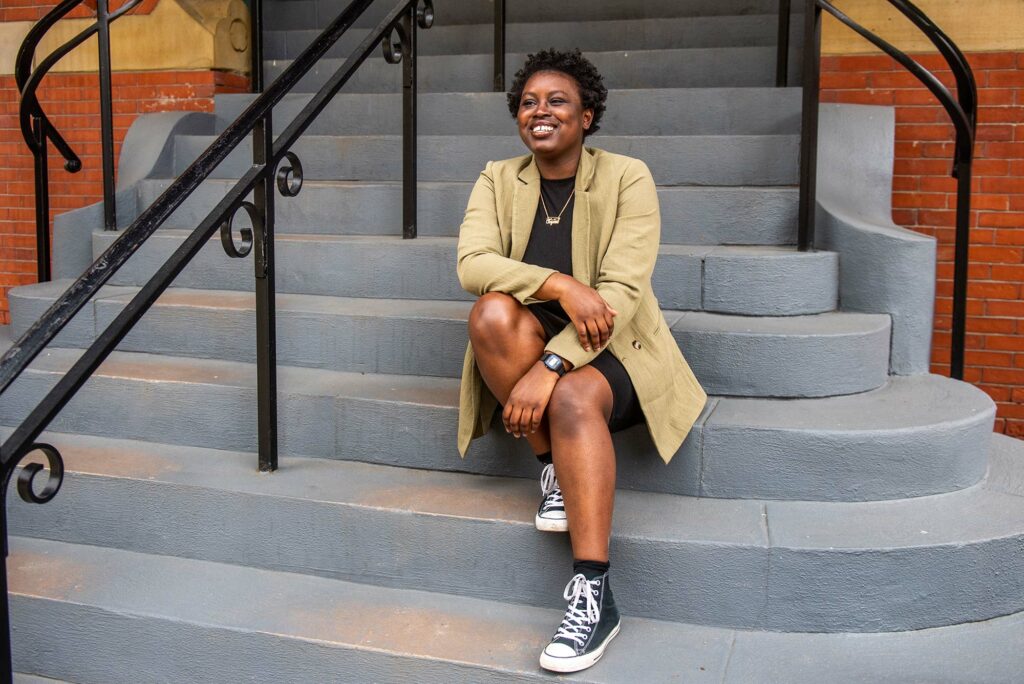‘You Don’t Need a Degree to Advocate for Yourself or Your Community’.

‘You Don’t Need a Degree to Advocate for Yourself or Your Community.’
Cheyenne Bailey graduated with her MPH in the spring of 2021 with a community assessment, program design, implementation, and evaluation (CAPDIE) certificate. During her tenure at the School of Public Health, she served in several impressive roles, including as an Activist Fellow for Neighborhood Empowerment, funded by The Boston Foundation. During Cheyenne’s fellowship, utilizing the power of storytelling, she worked to increase the ability of those living in public housing in Boston to advocate for improved conditions within the public housing system. Working with Boston REACH, Partnership in Health and Housing (PHH), the PHH Community Committee, and the Boston Housing Authority, she sought to address concerns about the physical and mental impacts of COVID-19. We were able to connect with her over Zoom about her experiences.

Q&A
SPH: Why did you apply to be the Boston Foundation Activist Fellow?
Wh
SPH: Why is this project important? How does it impact health?
Th
From there, I helped create a document of all resources on how to get vaccines, access to free transportation to get folks to vaccine sites, and so on. I was able to work with SPH students from the COVID Corps (Nisha Purvi, Tamanna Syed, and Kerra Washington), and created beautiful infographics that we then mailed to over 9,000 residents in Boston through the Boston Housing Authority. The hope was that those infographics would educate and encourage more folks to get vaccinated.
It was great working with so many different local organizations, such as the Boston Housing Authority and the Boston Public Health Commission. It was inspiring to see how we took this project from a nine-person community committee and made it into something that was able to reach thousands of families by working with other groups. I truly did not think we would have that big of a reach, but it just shows you the power of community advocacy and what folks can do when they have access to essential resources.
Many of the people I worked with during this fellowship have been doing advocacy work within their housing developments for over twenty years, they know the residents by name. I thought a lot about how these are the voices that need to be heard. These are the people that we need to be talking about. I think sometimes in academia, we get so focused on people doing research, but what about the folks on the ground doing the work? It was great to be inspired by community members who endlessly show love for their community and work to better educate those around them. It was such a great experience overall, and it was inspiring to say the least.
SPH: What did you learn from this experience?
一个
SPH: What advice would you give to future Activist Fellows?
Be committed to the project, and to seeing the change in a community or the betterment of a situation. At some points, it felt like I didn’t know where this was going to go because everything in the world surrounding COVID was changing, and we had to adapt.
Be flexible, understanding, creative, and don’t lose hope in seeing the project come to fruition.
SPH: Where do you see yourself next?
I am working as a consultant for a healthcare company based in New York City that works to increase healthcare access for historically under-supported communities in the city. I also help health organizations provide more crucial services for their clients. Being able to do the work that I came to BU to do is pretty great. I feel as though I am doing work that will help increase access to underserved communities that look like mine.
Before this experience, I never thought I was qualified to serve folks as a public health advocate, and now I see myself continuing down this path. I can see myself working in health policy. If we can change policy, we can be affecting so many people’s lives. There are so many pieces of this puzzle that make up health for all, and I want to contribute to figuring it out.